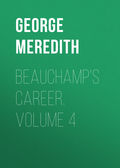
George Meredith
Vittoria. Complete
Antonio-Pericles waved his arm between the two young men.
Their plain perplexity caused him to dash his fingers down each side of his moustachios in tugs of enjoyment.
For Lieutenant Pierson, who displayed a certain readiness to bow, had caught a sight of the repellent stare on Ammiani’s face; a still and flat look, not aggressive, yet anything but inviting; like a shield.
Nevertheless, the lieutenant’s head produced a stiff nod. Carlo’s did not respond; but he lifted his hat and bowed humbly in retirement to the ladies.
Captain Gambier stepped aside with him.
‘Inform Lieutenant Pierson, I beg you,’ said Ammiani, ‘that I am at his orders, if he should consider that I have insulted him.’
‘By all means,’ said Gambier; ‘only, you know, it’s impossible for me to guess what is the matter; and I don’t think he knows.’
Luciano happened to be coming near. Carlo went up to him, and stood talking for half a minute. He then returned to Captain Gambier, and said, ‘I put myself in the hands of a man of honour. You are aware that Italian gentlemen are not on terms with Austrian officers. If I am seen exchanging salutes with any one of them, I offend my countrymen; and they have enough to bear already.’
Perceiving that there was more in the background, Gambier simply bowed. He had heard of Italian gentlemen incurring the suspicion of their fellows by merely being seen in proximity to an Austrian officer.
As they were parting, Carlo said to him, with a very direct meaning in his eyes, ‘Go to the opera tonight.’
‘Yes, I suppose so,’ the Englishman answered, and digested the look and the recommendation subsequently.
Lieutenant Pierson had ridden off. The war-machine was in motion from end to end: the field of flowers was a streaming flood; regiment by regiment, the crash of bands went by. Outwardly the Italians conducted themselves with the air of ordinary heedless citizens, in whose bosoms the music set no hell-broth boiling. Patrician and plebeian, they were chiefly boys; though here and there a middle-aged workman cast a look of intelligence upon Carlo and Luciano, when these two passed along the crowd. A gloom of hoarded hatred was visible in the mass of faces, ready to spring fierily.
Arms were in the city. With hatred to prompt the blow, with arms to strike, so much dishonour to avenge, we need not wonder that these youths beheld the bit of liberty in prospect magnified by their mighty obfuscating ardour, like a lantern in a fog. Reason did not act. They were in such a state when just to say ‘Italia! Italia!’ gave them nerve to match an athlete. So, the parading of Austria, the towering athlete, failed of its complete lesson of intimidation, and only ruffled the surface of insurgent hearts. It seemed, and it was, an insult to the trodden people, who read it as a lesson for cravens: their instinct commonly hits the bell. They felt that a secure supremacy would not have paraded itself: so they divined indistinctly that there was weakness somewhere in the councils of the enemy. When the show had vanished, their spirits hung pausing, like the hollow air emptied of big sound, and reacted. Austria had gained little more by her display than the conscientious satisfaction of the pedagogue who lifts the rod to advise intending juvenile culprits how richly it can be merited and how poor will be their future grounds of complaint.
But before Austria herself had been taught a lesson she conceived that she had but one man and his feeble instruments, and occasional frenzies, opposed to her, him whom we saw on the Motterone, which was ceasing to be true; though it was true that the whole popular movement flowed from that one man. She observed travelling sparks in the embers of Italy, and crushed them under her heel, without reflecting that a vital heat must be gathering where the spots of fire run with such a swiftness. It was her belief that if she could seize that one man, whom many of the younger nobles and all the people acknowledged as their Chief—for he stood then without a rival in his task—she would have the neck of conspiracy in her angry grasp. Had she caught him, the conspiracy for Italian freedom would not have crowed for many long seasons; the torch would have been ready, but not the magazine. He prepared it; it was he who preached to the Italians that opportunity is a mocking devil when we look for it to be revealed; or, in other words, wait for chance; as it is God’s angel when it is created within us, the ripe fruit of virtue and devotion. He cried out to Italians to wait for no inspiration but their own; that they should never subdue their minds to follow any alien example; nor let a foreign city of fire be their beacon. Watching over his Italy; her wrist in his meditative clasp year by year; he stood like a mystic leech by the couch of a fair and hopeless frame, pledged to revive it by the inspired assurance, shared by none, that life had not forsaken it. A body given over to death and vultures-he stood by it in the desert. Is it a marvel to you that when the carrion-wings swooped low, and the claws fixed, and the beak plucked and savoured its morsel, he raised his arm, and urged the half-resuscitated frame to some vindicating show of existence? Arise! he said, even in what appeared most fatal hours of darkness. The slack limbs moved; the body rose and fell. The cost of the effort was the breaking out of innumerable wounds, old and new; the gain was the display of the miracle that Italy lived. She tasted her own blood, and herself knew that she lived.
Then she felt her chains. The time was coming for her to prove, by the virtues within her, that she was worthy to live, when others of her sons, subtle and adept, intricate as serpents, bold, unquestioning as well-bestridden steeds, should grapple and play deep for her in the game of worldly strife. Now—at this hour of which I speak—when Austrians marched like a merry flame down Milan streets, and Italians stood like the burnt-out cinders of the fire-grate, Italy’s faint wrist was still in the clutch of her grave leech, who counted the beating of her pulse between long pauses, that would have made another think life to be heaving its last, not beginning.
The Piazza d’Armi was empty of its glittering show.
CHAPTER XVIII
THE NIGHT OF THE FIFTEENTH
We quit the Piazza d’Armi. Rumour had its home in Milan. On their way to the caffe La Scala, Luciano and Carlo (who held together, determined to be taken together if the arrest should come) heard it said that the Chief was in Milan. A man passed by and uttered it, going. They stopped a second man, who was known to them, and he confirmed the rumour. Glad as sunlight once more, they hurried to Count Medole forgivingly. The count’s servant assured them that his master had left the city for Monza. ‘Is Medole a coward?’ cried Luciano, almost in the servant’s hearing. The fleeing of so important a man looked vile, now that they were sharpened by new eagerness. Forthwith they were off to Agostino, believing that he would know the truth. They found him in bed. ‘Well, and what?’ said Agostino, replying to their laughter. ‘I am old; too old to stride across a day and night, like you giants of youth. I take my rest when I can, for I must have it.’
‘But, you know, O conscript father,’ said Carlo, willing to fall a little into his mood, ‘you know that nothing will be done to-night.’
‘Do I know so much?’ Agostino murmured at full length.
‘Do you know that the Chief is in the city?’ said Luciano.
‘A man who is lying in bed knows this,’ returned Agostino, ‘that he knows less than those who are up, though what he does know he perhaps digests better. ‘Tis you who are the fountains, my boys, while I am the pool into which you play. Say on.’
They spoke of the rumour. He smiled at it. They saw at once that the rumour was false, for the Chief trusted Agostino.
‘Proceed to Barto, the mole,’ he said, ‘Barto the miner; he is the father of daylight in the city: of the daylight of knowledge, you understand, for which men must dig deep. Proceed to him;—if you can find him.’
But Carlo brought flame into Agostino’s eyes.
‘The accursed beast! he has pinned the black butterfly to the signorina’s dress.’
Agostino rose on his elbow. He gazed at them. ‘We are followers of a blind mole,’ he uttered with an inner voices while still gazing wrathfully, and then burst out in grief, ‘“Patria o mea creatrix, patria o mea genetrix!”’
‘The signorina takes none of his warnings, nor do we. She escaped a plot last night, and to-night she sings.’
‘She must not,’ said Agostino imperiously.
‘She does.’
‘I must stop that.’ Agostino jumped out of bed.
The young men beset him with entreaties to leave the option to her.
‘Fools!’ he cried, plunging a rageing leg into his garments. ‘Here, Iris! Mercury! fly to Jupiter and say we are all old men and boys in Italy, and are ready to accept a few middleaged mortals as Gods, if they will come and help us. Young fools! Do you know that when you conspire you are in harness, and yoke-fellows, every one?’
‘Yoked to that Barto Rizzo!’
‘Yes; and the worse horse of the two. Listen, you pair of Nuremberg puppet-heads! If the Chief were here, I would lie still in my bed. Medole has stopped the outbreak. Right or wrong, he moves a mass; we are subordinates—particles. The Chief can’t be everywhere. Milan is too hot for him. Two men are here, concealed—Rinaldo and Angelo Guidascarpi. The rumour springs from that. They have slain Count Paul Lenkenstein, and rushed to old Milan for work, with the blood on their swords. Oh, the tragedy!—when I have time to write it. Let me now go to my girl, to my daughter! The blood of the Lenkenstein must rust on the steel. Angelo slew him: Rinaldo gave him the cross to kiss. You shall have the whole story by-and-by; but this will be a lesson to Germans not to court our Italian damsels. Lift not that curtain, you Pannonian burglars! Much do we pardon; but bow and viol meet not, save that they be of one wood; especially not when signor bow is from yonderside the Rhoetian Alps, and donzella Viol is a growth of warm Lombardy. Witness to it, Angelo and Rinaldo Guidascarpi! bravo! You boys there—you stand like two Tyrolese salad-spoons! I say that my girl, my daughter, shall never help to fire blank shot. I sent my paternal commands to her yesterday evening. Does the wanton disobey her father and look up to a pair of rocket-headed rascals like you? Apes! if she sings that song to-night, the ear of Italy will be deaf to her for ever after. There’s no engine to stir to-night; all the locks are on it; she will send half-a-dozen milkings like you to perdition, and there will be a circle of black blood about her name in the traditions of the insurrection—do you hear? Have I cherished her for that purpose? to have her dedicated to a brawl!’
Agostino fumed up and down the room in a confusion of apparel, savouring his epithets and imaginative peeps while he stormed, to get a relish out of something, as beseems the poetic temperament. The youths were silenced by him; Carlo gladly.
‘Troop!’ said the old man, affecting to contrast his attire with theirs; ‘two graces and a satyr never yet went together, and we’ll not frighten the classic Government of Milan. I go out alone. No, Signor Luciano, I am not sworn to Count Medole. I see your sneer contain it. Ah! what a thing is hurry to a mind like mine. It tears up the trees by the roots, floods the land, darkens utterly my poor quiet universe. I was composing a pastoral when you came in. Observe what you have done with my “Lovely Age of Gold!”’
Agostino’s transfigurement from lymphatic poet to fiery man of action, lasted till his breath was short, when the necessity for taking a deep draught of air induced him to fall back upon his idle irony. ‘Heads, you illustrious young gentlemen!—heads, not legs and arms, move a conspiracy. Now, you—think what you will of it—are only legs and arms in this business. And if you are insubordinate, you present the shocking fabular spirit of the members of the body in revolt; which is not the revolt we desire to see. I go to my daughter immediately, and we shall all have a fat sleep for a week, while the Tedeschi hunt and stew and exhaust their naughty suspicions. Do you know that the Pope’s Mouth is closed? We made it tell a big lie before it shut tight on its teeth—a bad omen, I admit; but the idea was rapturously neat. Barto, the sinner—be sure I throttle him for putting that blot on my swan; only, not yet, not yet: he’s a blind mole, a mad patriot; but, as I say, our beast Barto drew an Austrian to the Mouth last night, and led the dog to take a letter out of it, detailing the whole plot of tonight, and how men will be stationed at the vicolo here, ready to burst out on the Corso, and at the vicolo there, and elsewhere, all over the city, carrying fire and sword; a systematic map of the plot. It was addressed to Count Serabiglione—my boys! my boys! what do you think of it? Bravo! though Barto is a deadly beast if he—‘Agostino paused. ‘Yes, he went too far! too far!’
‘Has he only gone too far, do you say?’
Carlo spoke sternly. His elder was provoked enough by his deadness of enthusiasm, and that the boy should dare to stalk on a bare egoistical lover’s sentiment to be critical of him, Agostino, struck him as monstrous. With the treachery of controlled rage, Agostino drew near him, and whispered some sentences in his ear.
Agostino then called him his good Spartan boy for keeping brave countenance. ‘Wait till you comprehend women philosophically. All’s trouble with them till then. At La Scala tonight, my sons! We have rehearsed the fiasco; the Tedeschi perform it. Off with you, that I may go out alone!’
He seemed to think it an indubitable matter that he would find Vittoria and bend her will.
Agostino had betrayed his weakness to the young men, who read him with the keen eyes of a particular disapprobation. He delighted in the dark web of intrigue, and believed himself to be no ordinary weaver of that sunless work. It captured his imagination, filling his pride with a mounting gas. Thus he had become allied to Medole on the one hand, and to Barto Rizzo on the other. The young men read him shrewdly, but speaking was useless.
Before Carlo parted from Luciano, he told him the burden of the whisper, which had confirmed what he had heard on the Piazzi d’Armi. It was this: Barto Rizzo, aware that Lieutenant Pierson was the bearer of despatches from the Archduke in Milan to the marshal, then in Verona, had followed, and by extraordinary effort reached Verona in advance; had there tricked and waylaid him, and obtained, instead of despatches, a letter of recent date, addressed to him by Vittoria, which compromised the insurrectionary project.
‘If that’s the case, my Carlo!’ said his friend, and shrugged, and spoke in a very worldly fashion of the fair sex.
Carlo shook him off. For the rest of the day he was alone, shut up with his journalistic pen. The pen traversed seas and continents like an old hack to whom his master has thrown the reins. Apart from the desperate perturbation of his soul, he thought of the Guidascarpi, whom he knew, and was allied to, and of the Lenkensteins, whom he knew likewise, or had known in the days when Giacomo Piaveni lived, and Bianca von Lenkenstein, Laura’s sister, visited among the people of her country. Countess Anna and Countess Lena von Lenkenstein were the German beauties of Milan, lively little women, and sweet. Between himself and Countess Lena there had been tender dealings about the age when sweetmeats have lost their attraction, and the charm has to be supplied. She was rich, passionate for Austria, romantic concerning Italy, a vixen in temper, but with a pearly light about her temples that kept her picture in his memory. And besides, during those days when women are bountiful to us as Goddesses, give they never so little, she had deigned to fondle hands with him; had set the universe rocking with a visible heave of her bosom; jingled all the keys of mystery; and had once (as to embalm herself in his recollection), once had surrendered her lips to him. Countess Lena would have espoused Ammiani, believing in her power to make an Austrian out of such Italian material. The Piaveni revolt had stopped that and all their intercourse by the division of the White Hand, as it was called; otherwise, the hand of the corpse. Ammiani had known also Count Paul von Lenkenstein. To his mind, death did not mean much, however pleasant life might be: his father and his friend had gone to it gaily; and he himself stood ready for the summons: but the contemplation of a domestic judicial execution, which the Guidascarpi seemed to have done upon Count Paul, affrighted him, and put an end to his temporary capacity for labour. He felt as if a spent shot were striking on his ribs; it was the unknown sensation of fear. Changeing, it became pity. ‘Horrible deaths these Austrians die!’ he said.
For a while he regarded their lot as the hardest. A shaft of sunlight like blazing brass warned him that the day dropped. He sent to his mother’s stables, and rode at a gallop round Milan, dining alone in one of the common hotel gardens, where he was a stranger. A man may have good nerve to face the scene which he is certain will be enacted, who shrinks from an hour that is suspended in doubt. He was aware of the pallor and chill of his looks, and it was no marvel to him when two sbirri in mufti, foreign to Milan, set their eyes on him as they passed by to a vacant table on the farther side of the pattering gold-fish pool, where he sat. He divined that they might be in pursuit of the Guidascarpi, and alive to read a troubled visage. ‘Yet neither Rinaldo nor Angelo would look as I do now,’ he thought, perceiving that these men were judging by such signs, and had their ideas. Democrat as he imagined himself to be, he despised with a nobleman’s contempt creatures who were so dead to the character of men of birth as to suppose that they were pale and remorseful after dealing a righteous blow, and that they trembled! Ammiani looked at his hand: no force of his will could arrest its palsy. The Guidascarpi were sons of Bologna. The stupidity of Italian sbirri is proverbial, or a Milanese cavalier would have been astonished to conceive himself mistaken for a Bolognese. He beckoned to the waiter, and said, ‘Tell me what place has bred those two fellows on the other side of the fountain.’ After a side-glance of scrutiny, the reply was, ‘Neapolitans.’ The waiter was ready to make an additional remark, but Ammiani nodded and communed with a toothpick. He was sure that those Neapolitans were recruits of the Bolognese Polizia; on the track of the Guidascarpi, possibly. As he was not unlike Angelo Guidascarpi in figure, he became uneasy lest they should blunder ‘twixt him and La Scala; and the notion of any human power stopping him short of that destination, made Ammiani’s hand perfectly firm. He drew on his gloves, and named the place whither he was going, aloud. ‘Excellency,’ said the waiter, while taking up and pretending to reckon the money for the bill: ‘they have asked me whether there are two Counts Ammiani in Milan.’ Carlo’s eyebrows started. ‘Can they be after me?’ he thought, and said: ‘Certainly; there is twice anything in this world, and Milan is the epitome of it.’
Acting a part gave him Agostino’s catching manner of speech. The waiter, who knew him now, took this for an order to say ‘Yes.’ He had evidently a respect for Ammiani’s name: Carlo supposed that he was one of Milan’s fighting men. A sort of answer leading to ‘Yes’ by a circuit and the assistance of the hearer, was conveyed to the sbirri. They were true Neapolitans quick to suspect, irresolute upon their suspicions. He was soon aware that they were not to be feared more than are the general race of bunglers, whom the Gods sometimes strangely favour. They perplexed him: for why were they after him? and what had made them ask whether he had a brother? He was followed, but not molested, on his way to La Scala.
Ammiani’s heart was in full play as he looked at the curtain of the stage. The Night of the Fifteenth had come. For the first few moments his strong excitement fronting the curtain, amid a great host of hearts thumping and quivering up in the smaller measures like his own, together with the predisposing belief that this was to be a night of events, stopped his consciousness that all had been thwarted; that there was nothing but plot, plot, counterplot and tangle, disunion, silly subtlety, jealousy, vanity, a direful congregation of antagonistic elements; threads all loose, tongues wagging, pressure here, pressure there, like an uncertain rage in the entrails of the undirected earth, and no master hand on the spot to fuse and point the intense distracted forces.
The curtain, therefore, hung like any common opera-screen; big only with the fate of the new prima donna. He was robbed even of the certainty that Vittoria would appear. From the blank aspect of the curtain he turned to the house, which was crowding fast, and was not like listless Milan about to criticize an untried voice. The commonly empty boxes of the aristocracy were full of occupants, and for a wonder the white uniforms were not in excess, though they were to be seen. The first person whom Ammiani met was Agostino, who spoke gruffly. Vittoria had been invisible to him. Neither the maestro, nor the impresario, nor the waiting-woman had heard of her. Uncertainty was behind the curtain, as well as in front; but in front it was the uncertainty which is tipped with expectation, hushing the usual noisy chatter, and setting a daylight of eyes forward. Ammiani spied about the house, and caught sight of Laura Piaveni with Colonel Corte by her side. The Lenkensteins were in the Archduke’s box. Antonio-Pericles, and the English lady and Captain Gambier, were next to them. The appearance of a white uniform in his mother’s box over the stage caused Ammiani to shut up his glass. He was making his way thither for the purpose of commencing the hostilities of the night, when Countess Ammiani entered the lobby, and took her son’s arm with a grave face and a trembling touch.







